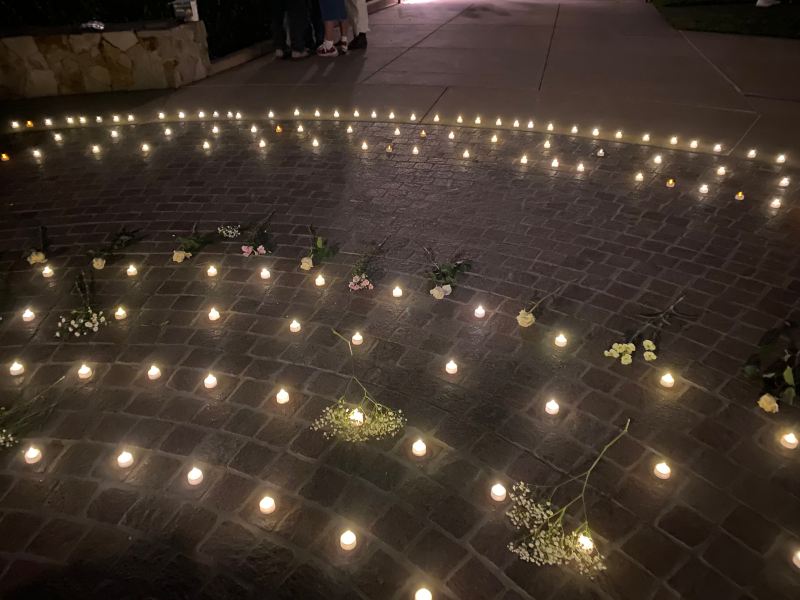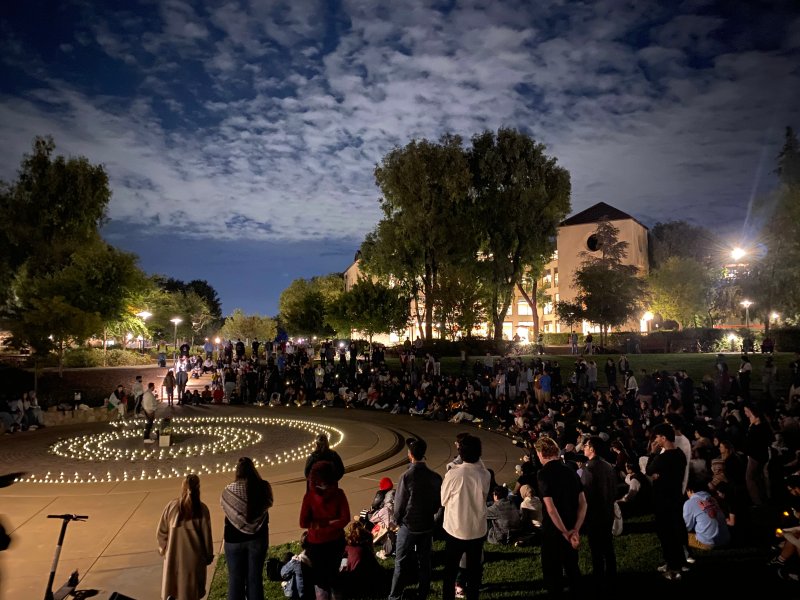A Stanford senior told a crowd of Stanford community members that he lost three family members to the Israel-Gaza conflict this week, at a vigil honoring the loss of Palestinian life.
Ali — who did not share his last name at the vigil, but whose identity was verified by The Daily — had extended family living in Gaza when Israeli carpet bombing in Gaza’s Deir al Balah killed three generations of his family members: a grandfather, father and two-year old daughter.
400 community members gathered Friday evening for a candlelight vigil at Meyer Green. The vigil, held by Stanford Students for Justice in Palestine, honored the thousands of Palestinian lives lost throughout Israel’s 75-year-long military occupation.
“Why do you think three generations of Palestinians get wiped out with one airstrike?” Ali, who is Palestinian-American, said to the crowd. “It’s because this is an indiscriminate genocide of Palestinians across Gaza and across Palestine. This ethnic cleansing campaign is not a new one.”
The decades-long conflict escalated last weekend when, on Oct. 7, Palestinian militant group Hamas led a surprise attack targeting Israeli civilians, killing over 1,300 people and wounding 3,400 in Israel as of Sunday.
150 civilians and soldiers were taken hostage by Hamas fighters.
Israeli Prime Minister Benjamin Netanyahu declared a state of war later that day and has pummeled the Gaza strip with air strikes. Israeli air strikes killed more than 2,600 people and wounded over 9,700 in Gaza as of Sunday, according to the Palestinian health ministry.
Israel also ordered a “complete siege” of Gaza, cutting off food, electricity, fuel and water supplies. Israel told one million civilians in northern Gaza to flee south ahead of a ground invasion, though air strikes continue, including on an escape route to the south.
At the vigil, Palestinian students described the distress they’ve felt since last weekend and the toll it has taken on their well-being.
“I have not slept, I have not been able to focus on my work or on anything other than this in the past week,” said Ronnie Hafez ’25, a Palestinian-American student with family in the West Bank.
His sister Lara Hafez ’24 echoed this sentiment and described feeling survivor’s guilt for living at Stanford while the conflict waged overseas.
“Every morning this past week I’ve been feeling guilty […] for the privilege to be here today, the privilege to get water if I’m thirsty, the privilege to eat if I’m hungry, the privilege to talk to my immediate family members whenever I want to, the privilege to plan out my future,” she said. “That is not the reality of Palestinians in Gaza right now, who for so many of them, are awaiting and expecting death.”
During the vigil, students read out a few names of the many Palestinian lives lost in the conflict over the past decades. They laid a white rose on the ground for each name read.

Comparative Literature Professor David Palumbo-Liu spoke during the vigil and said it’s “been frustrating being at Stanford” and criticized the University administration’s response to the conflict.
The University did not immediately respond to a request for comment.
President Richard Saller and Provost Jenny Martinez released a statement Wednesday condemning “the deliberate attack on civilians this weekend by Hamas” after dozens of faculty signed a letter the day prior demanding the University take a harder stance on the conflict.
“For the president and provost to evoke international humanitarian law as a way to condemn Hamas… it is only morally consistent to then point out that Gaza is under an illegal military occupation and has been since 1967,” Palumbo-Liu told The Daily in an interview.
The University’s statement reiterated Stanford’s institutional policy of neutrality, adding that “the decision to take a position about one event or issue … can create a sense of institutional orthodoxy that chills academic freedom.”
In reference to the University statement, Palumbo-Liu said: “Do not look to Stanford for validation for who you are or what you are. Look to each other.”
Ronnie Hafez said the University’s response has only added to his pain.
“At this point, we are all we have. I don’t have any expectations from this university, from governments across the world to help people in Palestine,” he said. “To me, as a Palestinian student on this campus, to constantly have to justify our mourning, to justify the loss of our family members before I can grieve, has been painful.”
25 Stanford student organizations released a joint statement grieving the loss of thousands of lives over the past week and condemning “all violations of international law and attacks against unarmed civilians.”
“While we are deeply saddened by watching the developments that bring suffering to both Palestinian and Israeli citizens, we recognize the settler-colonial occupation of Palestinian indigenous land as a continuous ethnic cleansing,” the statement read. “We urge our colleagues in the Stanford community to join us and stand in solidarity with the Palestinian people, and for justice and peace for all.”
During the vigil, Ali urged attendants not to blindly call for a ceasefire or a return to the status quo — which he said for Palestinians is “routine, administrative detention without trial. It’s home demolition. It’s checkpoints. It’s consistent assassination and murders and mass ethnic cleansing. That’s the status quo for Palestinians.”
“When you walk away from tonight, I want you to think about what you want Palestine to look like in the future,” he said. “Because us Palestinians don’t want to go back to the status quo. We’re tired. We’re tired of being brutalized… We’re tired of being occupied.”
